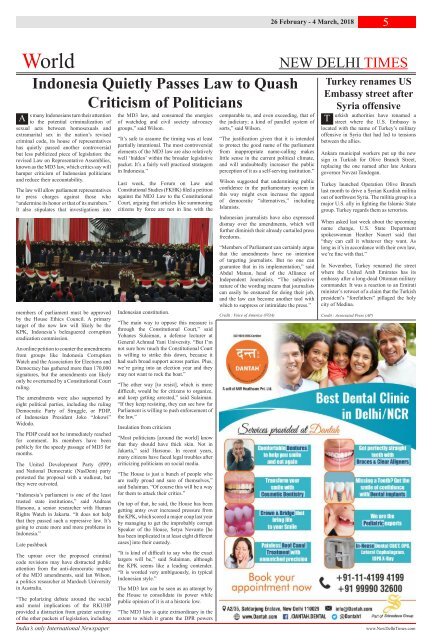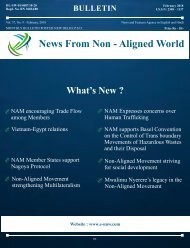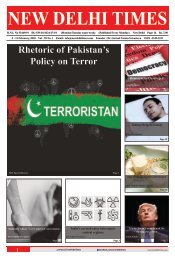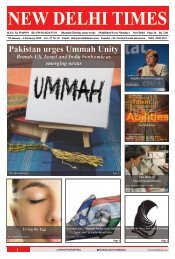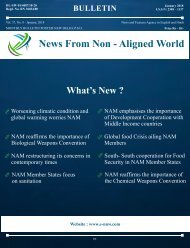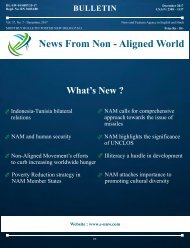26 February - 4 March 2018 - 16-new-min
Create successful ePaper yourself
Turn your PDF publications into a flip-book with our unique Google optimized e-Paper software.
<strong>26</strong> <strong>February</strong> - 4 <strong>March</strong>, <strong>2018</strong> 5<br />
World<br />
A<br />
NEW DELHI TIMES<br />
Indonesia Quietly Passes Law to Quash<br />
Criticism of Politicians<br />
s many Indonesians turn their attention<br />
to the potential cri<strong>min</strong>alization of<br />
sexual acts between homosexuals and<br />
extramarital sex in the nation’s revised<br />
cri<strong>min</strong>al code, its house of representatives<br />
has quietly passed another controversial<br />
but less publicized piece of legislation: the<br />
revised Law on Representative Assemblies,<br />
known as the MD3 law, which critics say will<br />
hamper criticism of Indonesian politicians<br />
and reduce their accountability.<br />
The law will allow parliament representatives<br />
to press charges against those who<br />
“under<strong>min</strong>e its honor or that of its members.”<br />
It also stipulates that investigations into<br />
members of parliament must be approved<br />
by the House Ethics Council. A primary<br />
target of the <strong>new</strong> law will likely be the<br />
KPK, Indonesia’s beleaguered corruption<br />
eradication commission.<br />
An online petition to counter the amendments<br />
from groups like Indonesia Corruption<br />
Watch and the Association for Elections and<br />
Democracy has gathered more than 170,000<br />
signatures, but the amendments can likely<br />
only be overturned by a Constitutional Court<br />
ruling.<br />
The amendments were also supported by<br />
eight political parties, including the ruling<br />
Democratic Party of Struggle, or PDIP,<br />
of Indonesian President Joko “Jokowi”<br />
Widodo.<br />
The PDIP could not be immediately reached<br />
for comment. Its members have been<br />
publicly for the speedy passage of MD3 for<br />
months.<br />
The United Development Party (PPP)<br />
and National Democratic (NasDem) party<br />
protested the proposal with a walkout, but<br />
they were outvoted.<br />
“Indonesia’s parliament is one of the least<br />
trusted state institutions,” said Andreas<br />
Harsono, a senior researcher with Human<br />
Rights Watch in Jakarta. “It does not help<br />
that they passed such a repressive law. It’s<br />
going to create more and more problems in<br />
Indonesia.”<br />
Late pushback<br />
The uproar over the proposed cri<strong>min</strong>al<br />
code revisions may have distracted public<br />
attention from the anti-democratic impact<br />
of the MD3 amendments, said Ian Wilson,<br />
a politics researcher at Murdoch University<br />
in Australia.<br />
“The polarizing debate around the social<br />
and moral implications of the RKUHP<br />
provided a distraction from greater scrutiny<br />
of the other packets of legislation, including<br />
India’s only International Newspaper<br />
the MD3 law, and consumed the energies<br />
of watchdog and civil society advocacy<br />
groups,” said Wilson.<br />
“It’s safe to assume the ti<strong>min</strong>g was at least<br />
partially intentional. The most controversial<br />
elements of the MD3 law are also relatively<br />
well ‘hidden’ within the broader legislative<br />
packet. It’s a fairly well practiced stratagem<br />
in Indonesia.”<br />
Last week, the Forum on Law and<br />
Constitutional Studies (FKHK) filed a petition<br />
against the MD3 Law to the Constitutional<br />
Court, arguing that articles like summoning<br />
citizens by force are not in line with the<br />
Indonesian constitution.<br />
“The main way to oppose this measure is<br />
through the Constitutional Court,” said<br />
Yohanes Sulaiman, a defense lecturer at<br />
General Achmad Yani University. “But I’m<br />
not sure how much the Constitutional Court<br />
is willing to strike this down, because it<br />
had such broad support across parties. Plus,<br />
we’re going into an election year and they<br />
may not want to rock the boat.”<br />
“The other way [to resist], which is more<br />
difficult, would be for citizens to organize,<br />
and keep getting arrested,” said Sulaiman.<br />
“If they keep resisting, they can see how far<br />
Parliament is willing to push enforcement of<br />
the law.”<br />
Insulation from criticism<br />
“Most politicians [around the world] know<br />
that they should have thick skin. Not in<br />
Jakarta,” said Harsono. In recent years,<br />
many citizens have faced legal troubles after<br />
criticizing politicians on social media.<br />
“The House is just a bunch of people who<br />
are really proud and sure of themselves,”<br />
said Sulaiman. “Of course this will be a way<br />
for them to attack their critics.”<br />
On top of that, he said, the House has been<br />
getting antsy over increased pressure from<br />
the KPK, which scored a major coup last year<br />
by managing to get the improbably corrupt<br />
Speaker of the House, Setya Novanto [he<br />
has been implicated in at least eight different<br />
cases] into their custody.<br />
“It is kind of difficult to say who the exact<br />
targets will be,” said Sulaiman, although<br />
the KPK seems like a leading contender.<br />
“It is worded very ambiguously, in typical<br />
Indonesian style.”<br />
The MD3 law can be seen as an attempt by<br />
the House to consolidate its power while<br />
public opinion of it is at a historic low.<br />
“The MD3 law is quite extraordinary in the<br />
extent to which it grants the DPR powers<br />
comparable to, and even exceeding, that of<br />
the judiciary; a kind of parallel system of<br />
sorts,” said Wilson.<br />
“The justification given that it is intended<br />
to protect the good name of the parliament<br />
from inappropriate name-calling makes<br />
little sense in the current political climate,<br />
and will undoubtedly increaser the public<br />
perception of it as a self-serving institution.”<br />
Wilson suggested that under<strong>min</strong>ing public<br />
confidence in the parliamentary system in<br />
this way might even increase the appeal<br />
of democratic “alternatives,” including<br />
Islamists.<br />
Indonesian journalists have also expressed<br />
dismay over the amendments, which will<br />
further di<strong>min</strong>ish their already curtailed press<br />
freedoms.<br />
“Members of Parliament can certainly argue<br />
that the amendments have no intention<br />
of targeting journalists. But no one can<br />
guarantee that in its implementation,” said<br />
Abdul Manan, head of the Alliance of<br />
Independent Journalists. “The subjective<br />
nature of the wording means that journalists<br />
can easily be ensnared for doing their job,<br />
and the law can become another tool with<br />
which to suppress or intimidate the press.”<br />
Credit : Voice of America (VOA)<br />
Turkey renames US<br />
Embassy street after<br />
T<br />
Syria offensive<br />
urkish authorities have renamed a<br />
street where the U.S. Embassy is<br />
located with the name of Turkey’s military<br />
offensive in Syria that had led to tensions<br />
between the allies.<br />
Ankara municipal workers put up the <strong>new</strong><br />
sign in Turkish for Olive Branch Street,<br />
replacing the one named after late Ankara<br />
governor Nevzat Tandogan.<br />
Turkey launched Operation Olive Branch<br />
last month to drive a Syrian Kurdish militia<br />
out of northwest Syria. The militia group is a<br />
major U.S. ally in fighting the Islamic State<br />
group. Turkey regards them as terrorists.<br />
When asked last week about the upco<strong>min</strong>g<br />
name change, U.S. State Department<br />
spokeswoman Heather Nauert said that<br />
“they can call it whatever they want. As<br />
long as it’s in accordance with their own law,<br />
we’re fine with that.”<br />
In November, Turkey renamed the street<br />
where the United Arab Emirates has its<br />
embassy after a long-dead Ottoman military<br />
commander. It was a reaction to an Emirati<br />
<strong>min</strong>ister’s retweet of a claim that the Turkish<br />
president’s “forefathers” pillaged the holy<br />
city of Medina.<br />
Credit : Associated Press (AP)<br />
www.NewDelhiTimes.com


